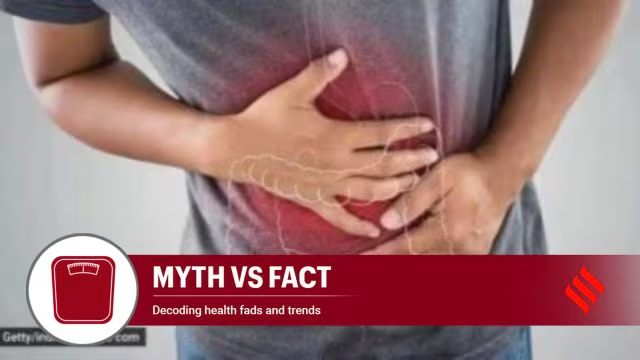
Although spicy foods can make symptoms worse for people who already have ulcers, they are not the main cause of the condition. (Image for representation only)
Many people believe that spicy foods cause ulcers, which has become a widespread misconception passed down over generations. This fear often leads us to avoid our favorite dishes to protect our stomachs. However, it’s important to debunk this myth once and for all and clarify the truth.
What Causes Ulcers?
Contrary to what many think, spicy foods aren’t the main cause of ulcers. Instead, most ulcers are triggered by the presence of a bacteria called Helicobacter pylori (H. pylori) or prolonged use of certain pain-relieving drugs like ibuprofen and aspirin. These drugs can interfere with the protective lining of the gut. H. pylori spreads through contaminated food and water, causing ulcers by sticking to the stomach lining and causing inflammation, making it easier for stomach acids to damage the lining. Treating the bacteria with medication can help. If you rely on pain relievers like NSAIDs, talk to your doctor about other options. Other causes of mouth ulcers include injuries, infections, and chemotherapy.
So, what about spicy foods? Well, while they might make symptoms worse for people who already have ulcers, they’re not the main cause of ulcers. Actually, some research shows that capsaicin, the spicy compound in these foods, might be good for your stomach. Studies suggest that capsaicin can stop the growth of H. pylori bacteria, which could lower the risk of getting ulcers. Also, capsaicin might help your stomach lining make more protective mucus, which can prevent ulcers from forming.
An expert talks about what you shouldn’t eat when your stomach is empty.
In 2015, a study published in BMJ found that people who ate spicy foods every day had a 14% lower risk of dying compared to those who ate spicy foods only once or twice a week. Interestingly, this link between eating spicy foods and living longer was stronger in people who didn’t drink alcohol compared to those who did.
Variation in Tolerance Levels: People have different levels of tolerance to spicy foods. Some can eat spicy dishes without any problems, while others might find that spicy foods make their stomach issues worse. If you’re in the second group, it’s best to be careful and avoid foods that worsen your symptoms. Spicy foods can make conditions like irritable bowel syndrome, dyspepsia, or inflammatory bowel disease (IBD) more uncomfortable. While spicy foods don’t cause hemorrhoids, they can make anal fissures feel worse due to the burning sensation.
Milk and Stomach Ulcers : While some believe that drinking milk can help with ulcers, the reality is that it can’t prevent or ease ulcers. In fact, it might make things worse by causing your stomach to produce more acid.




